#Ancient Coin
Explore tagged Tumblr posts
Text


~ Solidus with Licinia Eudoxia.
Period: Byzantine, Reign of Valentinian III
Date: A.D. 439
Mint: Ravenna
Medium: Gold
#ancient#ancient art#history#museum#archeology#ancient history#archaeology#coin#ancient currency#ancient coin#money#solidus#Licinia Eudoxia#Valentinian III#Byzantine#Byzantium#gold#Ravenna
989 notes
·
View notes
Text

Divus Augustus gold coin. Augustus died on 19th August 14 AD and he was deified by the Senate shortly after his funeral.
#ancient rome#roman empire#ancient history#ancient culture#julio claudian dynasty#augustus#emperor augustus#imperial cult#coin#roman coin#ancient coin#gold coin#aureus
72 notes
·
View notes
Text

Findings uncovered in the excavations of the Sanhedrin Trail. Photo by Clara Amit, Israel Antiquities Authority.
An ancient oil lamp engraved with an eight-branched menorah and evidence of the glass industry mentioned in rabbinical texts.
#ancient artifacts#artifacts#antique#ancient#archeology#jewish archeology#eretz israel#jewish history#jewish heritage#israel archeology#uploads#ישראבלר#ארץ ישראל#menorah#ancient coin#ancient israel
21 notes
·
View notes
Text

God this tetradrachm of Mithradates VI is gorgeous. Its going on sale through savoca on May 26. Here's the blurb>
Kings of Pontos. Mithradates VI Eupator 82-72 BC. Dated Bithyno Pontic Era 223, month 5 = February 74 BC. Tetradrachm AR
32 mm, 16,62 g
Diademed head to right / Stag grazing to left; BAΣIΛEΩΣ above, MIΘPAΔATOY EYΠATOPOΣ in two lines below; star-in-crescent above monogram to left, ΓKΣ (date) above monogram to right; all within Dionysiac wreath of ivy and fruit.
Extremely Fine
Callataÿ p. 20 and pl. X (D45/R3); DCA 692; HGC 7, 340.
Ex Roma Numismatics Ltd., E-Sale 106, 16 February 2023, lot 241 (hammer: GBP 2,600)
#coin#greek#ancient coin#numismatics#mithradates#pontos#tetradrachm#silver#art#ancient#ancient history#ancient art#angraving#deer#hair#ancient greece
8 notes
·
View notes
Text
hey so this is random but i have an ancient coin and no clue where to start figuring anything out about it?
I actually got it for free from Mercari because there was a mailing issue and the seller was generous enough to take responsibility. he refused to take my money.
I'll say firstly it does NOT look like it was stored properly (if there's such a thing? idk i don't actually collect coins honestly) and a small edge seems to have been broken off a long time ago.
I CAN tell you it looks copper. It says "Ptolemy III Lotus Blossom" on the package in pen and if you look, you can see there's a faded lotus-like design on the middle on one side, circled neatly in points or dots worked out of the metal (the fraction taken off bites into the circle just a tiny bit, though it's also rather faded on that side).
because of the glare from the packaging i'm struggling to get a good pic of it but if anyone who knows anything happens to see this and can tell me anything about how to get it properly "entombed"/displayed or whatever it would be much appreciated. i have tried to do a bit of research but sort of not had great luck, though I haven't gotten as serious as I should've with it yet.
in any case, thanks to anyone who read this, and sorry for my lack of knowledge and subsequent bad tagging.
#ancient coins#coin collecting#coin collection#archaeology#ptolemy iii#ptolemy III Euergetes#history#egyptian history#ancient coin#posts actually written by me
25 notes
·
View notes
Video
tumblr
3 notes
·
View notes
Text
Official Dire Omen
if she’s your girl why is she sucking on my ancient coin
19K notes
·
View notes
Text
Hey, Disney Dreamlight fans! 🌈 Are you ready to help Rapunzel make dreams come true? 🎉✨ Check out my latest blog post on completing the "I've Got a Dreamlight" quest! From cooking yummy meals to staging hero rescues, it's all here! 🍛💪✨ Don’t forget to visit the ancient wishing pool for that magical finishing touch! 💧🌟
#Disney Dreamlight Valley#Rapunzel Quest#I've Got A Dreamlight#Dreamlight Valley Guide#Cook With Remy#Ruby Masoor Dal#Gaston Rescue#Disney Gaming#Video Game Guides#Gaming Community#Disney Fans#Rapunzel#Remy The Chef#Level 4 Friendship Quest#Disney Quest#Cooking In Games#Disney Character#Wishing Pool#Ancient Coin#Fantasy Gaming#Gaming Tips#Quest Completion#Game Walkthrough#Epic Rescue#Family Gaming#Gamers#Game Strategy#Fun With Disney#Disney Adventure#Magic In Gaming
1 note
·
View note
Text
#stacks bowers#auction#coin#currency#bullion#ancient coin#silver coin#world paper currency#world coins#morgan dollar#graded#stacks bowers galleries
0 notes
Video
youtube
The History of Coins: When & Why Did People Start Using Coins?
0 notes
Text
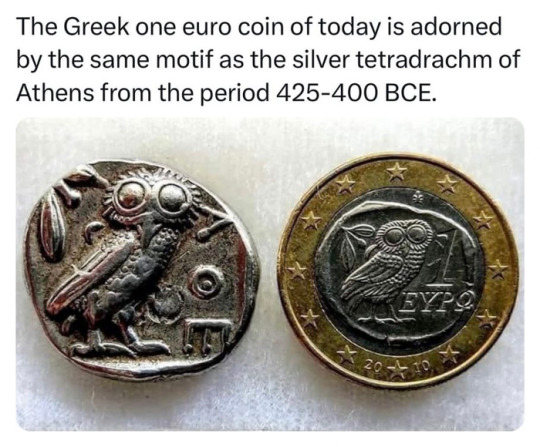
1K notes
·
View notes
Text


~ Stater of Phalasarna with head of Artemis.
Culture: Greek
Period: Late Classical Period
Date: 350 B.C.
Mint: Crete, Phalasarna
Medium: Silver
#ancient#ancient art#history#museum#archeology#ancient history#archaeology#greek#ancient coin#coin#numismatics#currency#stater of Phalasarna#artemis#late classical period#crete#silver#350 b.c.
1K notes
·
View notes
Text
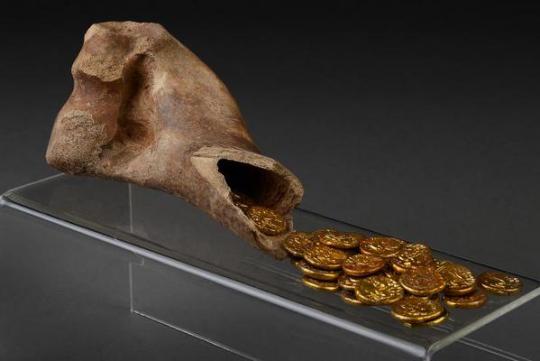
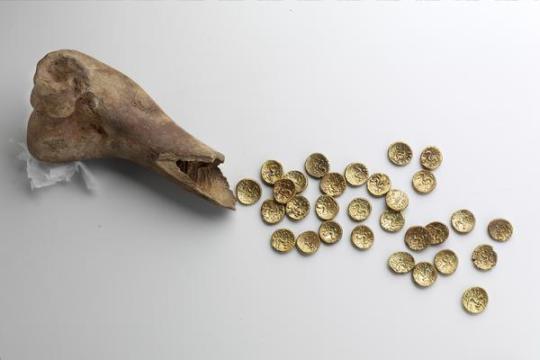
A hoard of Celtic gold coins hidden in a cow bone, discovered near Sedgewick, England, 1st century AD
from The Norfolk Museums Collections
3K notes
·
View notes
Text
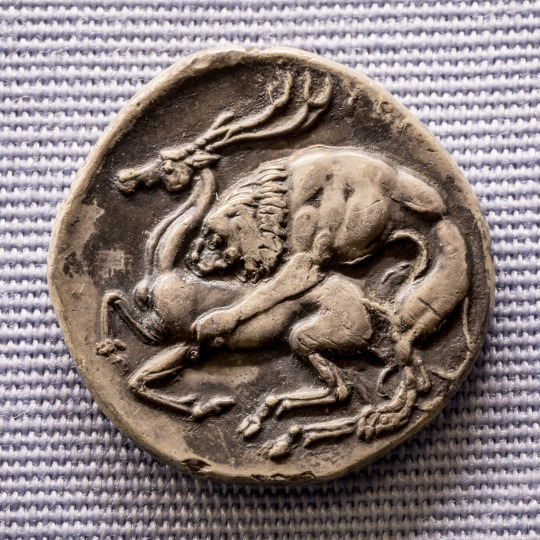
A lion attacks a stag. Reverse of a silver didrachm issued by the polis of Elea in southern Italy between 420 and 380 BCE. The obverse, not shown, bears the head of Athena. Now in the Staatliche Münzsammlung, Munich, Germany. Photo credit: ArchaiOptix/Wikimedia Commons.
#classics#tagamemnon#Ancient Greece#Magna Graecia#Classical Greece#art#art history#ancient art#Greek art#Ancient Greek art#Classical Greek art#coins#ancient coins#Greek coins#Ancient Greek coins#didrachm#numismatics#ancient numismatics#Staatliche Münzsammlung#animal violence tw
755 notes
·
View notes
Text
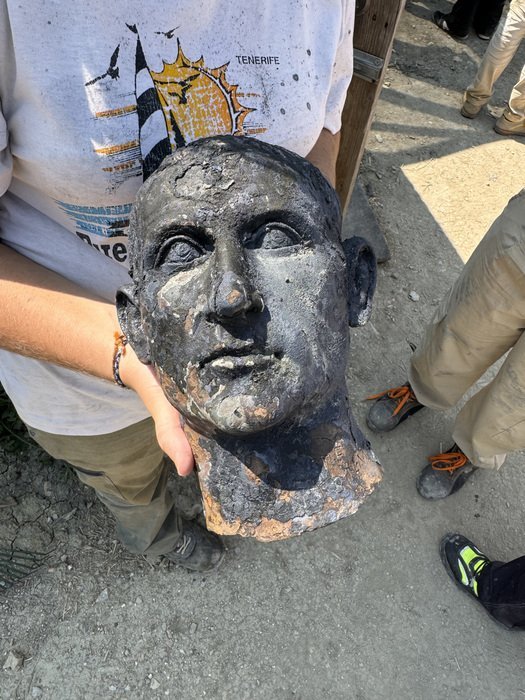
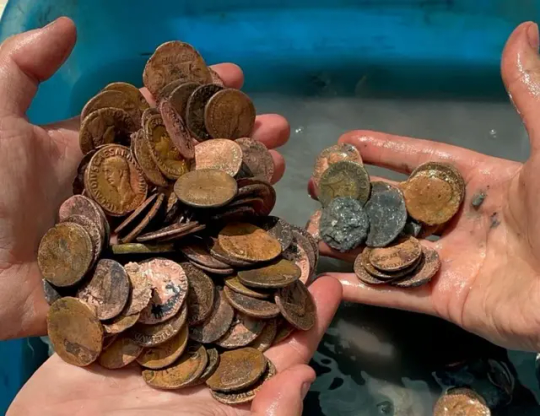
Bronze Statues and Coins Found at Ancient Sacred Bath in Tuscany
Archaeological excavations at the Bagno Grande sanctuary in San Casciano dei Bagni, Tuscany, Italy, have uncovered a wealth of artifacts that highlight the Etruscan-Roman heritage of this ancient thermal site.
Dating back to the 3rd century BCE, the sanctuary was originally constructed by the Etruscans and later developed by the Romans into the renowned spa complex, Balnea Clusinae. Revered for its therapeutic hot springs, the site attracted visitors from across the Roman Empire, including Caesar Augustus.
The recent excavation, spanning June to October 2024, focused on the sacred temenos, a walled enclosure surrounding the sanctuary, and revealed the remnants of a central temple built around a thermal water basin. Within this sacred space, archaeologists unearthed an array of votive offerings and artifacts remarkably preserved by thermal waters and clay.
Among the most notable finds are four bronze statues, votive limbs, and heads, inscribed with dedications. A striking bronze torso, bisected from neck to genitals, was dedicated by a man named Gaius Roscius to the “Hot Spring.” Researchers suggest this statue symbolizes the healing of specific ailments. Other discoveries include a child statue portraying an augur priest holding a pentagonal ball, likely used in divination rituals, and elegant votive heads inscribed in Latin.
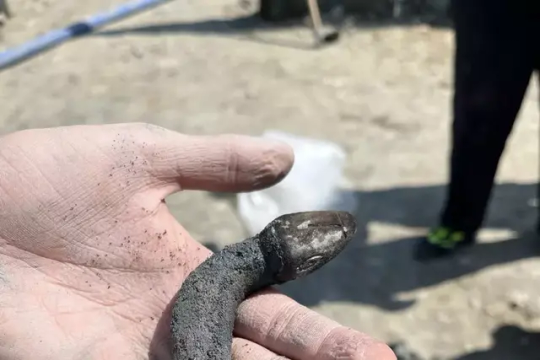
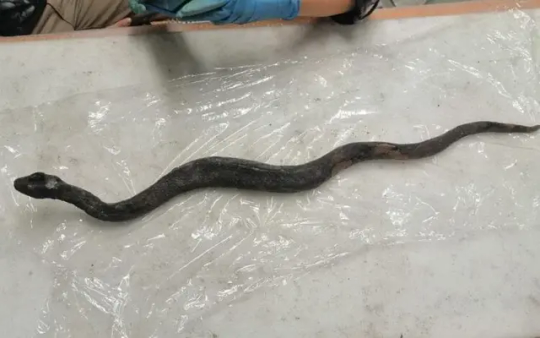
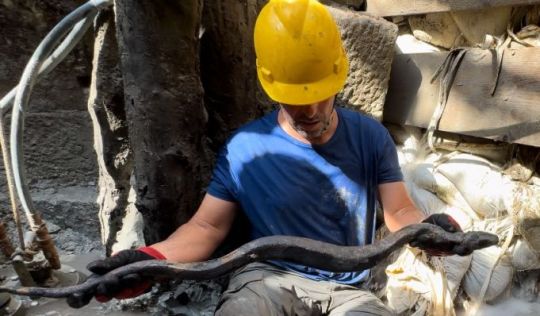
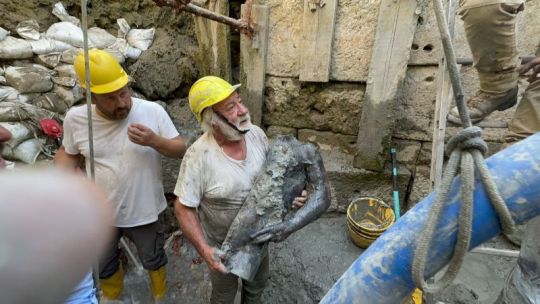
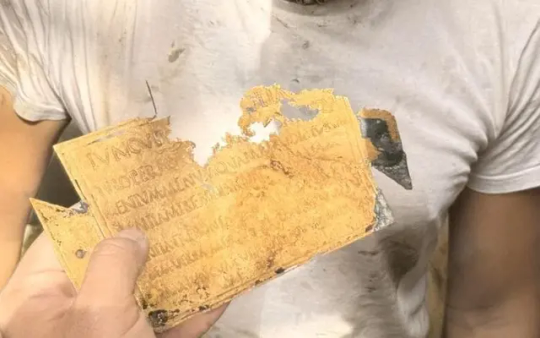
Inscriptions in both Etruscan and Latin were uncovered, including dedications to the Nymphs and the thermal spring, referred to as “Flere Havens” in Etruscan, and oaths to Fortuna and the Genius of the Emperor.
The sacred basin contained a diverse range of offerings, including oil lamps, glass unguent jars, painted terracotta anatomical votives, and coins—more than 10,000 spanning the Roman Republic to the Empire. Precious metals, such as a gold crown and ring, Roman aurei, and fragments of amber and gemstones, were also uncovered. Notably, the presence of preserved eggs, some with intact yolks, suggests rites symbolizing rebirth and regeneration.
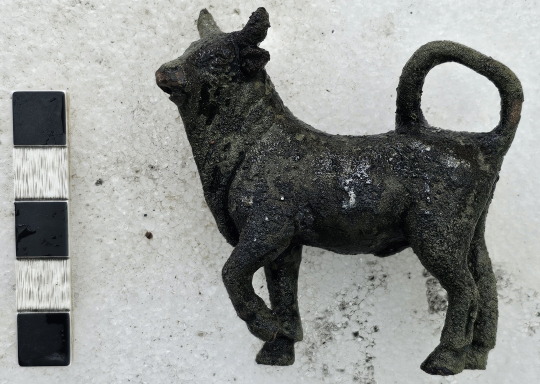
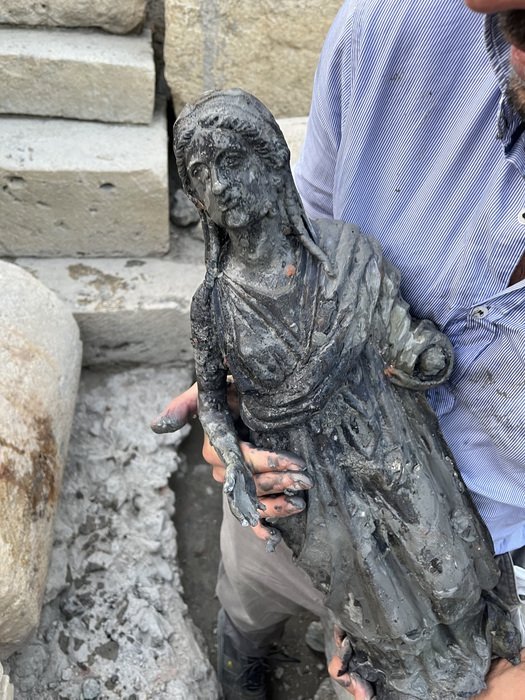
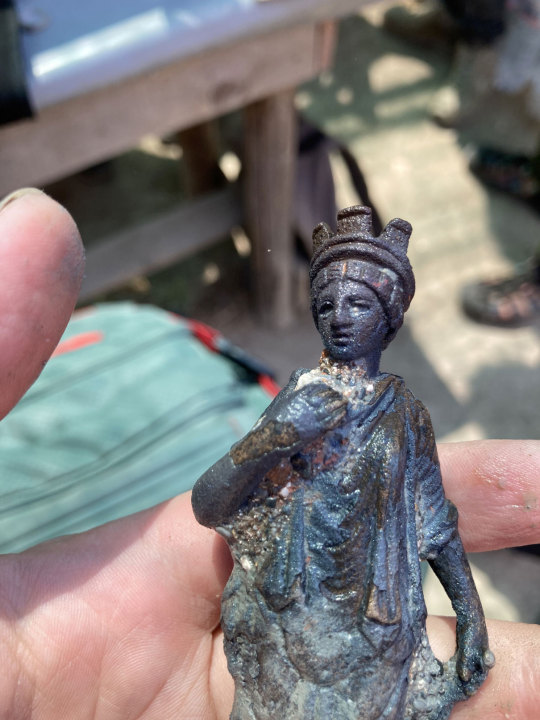
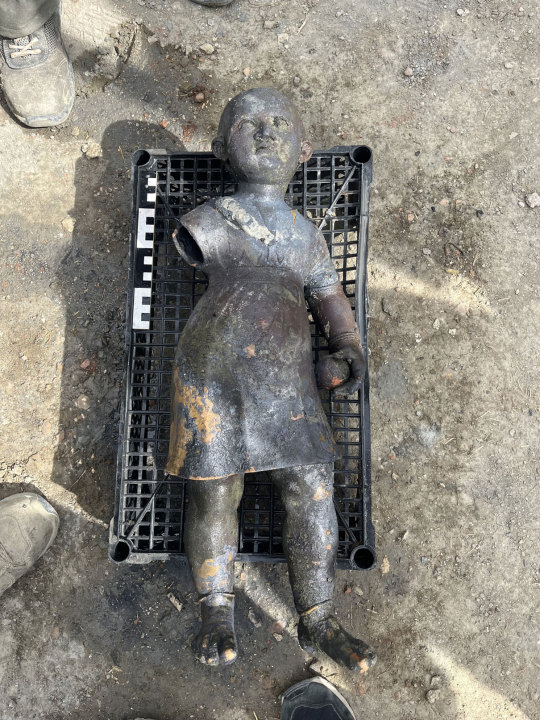
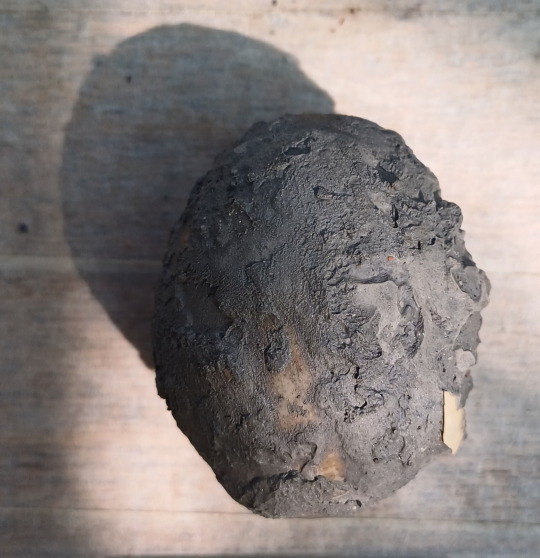
Decorative elements such as pinecones, branches, and bronze serpents—one nearly a meter long and thought to represent the Agathodaimon, a protective spirit—emphasize the connection between the rejuvenating waters and nature’s generative power.
Efforts are underway to preserve these extraordinary finds. The National Archaeological Museum of San Casciano dei Bagni is being established in the Archpriest’s Palace to house the artifacts, while a thermal archaeological park is planned around Bagno Grande to promote cultural tourism.
By Dario Radley.
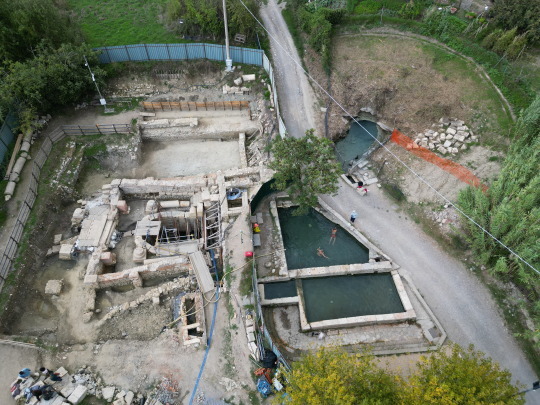
#Bronze Statues and Coins Found at Ancient Sacred Bath in Tuscany#Bagno Grande sanctuary in San Casciano dei Bagni#Balnea Clusinae#roman coins#ancient coins#bronze#bronze statues#bronze sculpture#ancient artifacts#archeology#archeolgst#history#history news#ancient history#ancient culture#ancient civilizations#roman history#roman empire#roman era
274 notes
·
View notes
Text
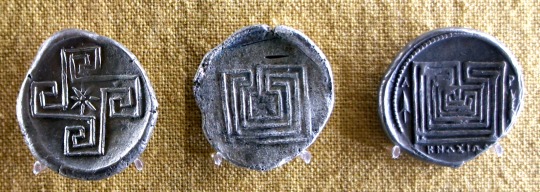
Ancient coins depicting the labyrinth from Knossos, Crete. Greek myths said that the rulers of Knossos built a labyrinth, at the center of which was a formidable minotaur. The stories tell of an Athenian hero, Theseus, who braved the maze and took on the monster.
{WHF} {Ko-Fi} {Medium}
3K notes
·
View notes